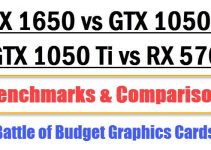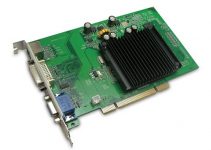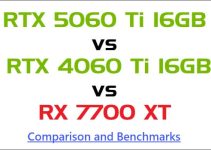GeForce GTX 1660 Ti is the first GTX 16 series graphics card from Nvidia. This is a completely new series from Nvidia, which is mainly targeted toward mainstream and budget gamers. GTX 1660 Ti is a mid-range card that is said to be the replacement for GTX 1060, but in reality, it is much more powerful and is a tough competitor to GTX 1070 and Radeon RX 590. GeForce GTX 1660 Ti is based on the Turing GPU architecture, but it does lack some of the features present in RTX Turing GPUs.
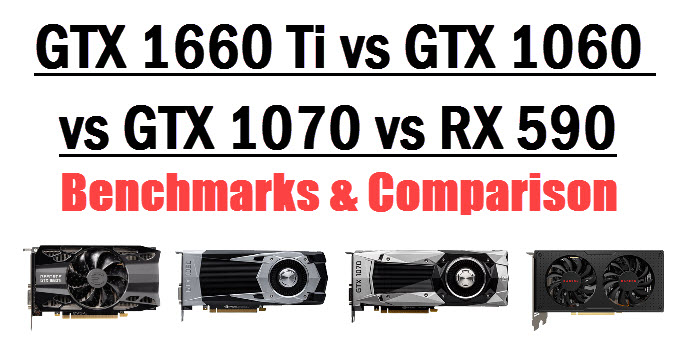
It is a card that can really give a boost to the mainstream gaming segment and has received much praise already. So, here I am going to compare it against its closest rivals, which are GTX 1060, GTX 1070, and RX 590 so that you can know about its performance, and features and can make a well-informed decision that whether this card deserves to be in your gaming PC or not.
GTX 1660 Ti vs GTX 1060 vs GTX 1070 vs RX 590
Here is a complete comparison between GTX 1660 Ti, GTX 1070, GTX 1060, and RX 590 graphics cards based on their specifications, performance, pricing, power consumption, and features.
GPU Architecture
GTX 1060 and GTX 1070 are built on Pascal GPU architecture with 14nm fabrication process while GTX 1660 Ti is built on Turing GPU architecture having 12nm manufacturing process. On the other hand, Radeon RX 590 is an AMD graphics card that is built on Polaris GPU architecture with 12nm process.
GTX 1060 comes with 1280 CUDA Cores; GTX 1070 with 1920 CUDA Cores and GTX 1660 Ti has 1536 CUDA Cores. On the other hand, Radeon RX 590 has got 2304 Stream Processors, which cannot be compared with CUDA Cores because of the difference in architecture and technology between Nvidia and AMD graphics cards.
| GTX 1060 | GTX 1070 | GTX 1660 Ti | RX 590 | |
| GPU Chip | GP104 / GP106 | GP104 | TU116 | Polaris 30 |
| Manufacturing Process | 14nm | 14nm | 12nm | 12nm |
| GPU Architecture | Pascal | Pascal | Turing | Polaris |
| CUDA Cores / Stream Processors | 1280 CUDA Cores | 1920 CUDA Cores | 1536 CUDA Cores | 2304 Stream Processors |
Must Read: CUDA Cores vs Stream Processors Difference
Memory [VRAM]
GTX 1060 and GTX 1660 Ti come with 6GB video memory having a 192-bit interface, but they differ in memory type and speed. The former one comes with GDDR5 / GDDR5X memory and the latter one has got GDDR6 memory, which is must faster than GDDR5 and GDDR5X memory types. On the other hand, both GTX 1070 and Radeon RX 590 come with 8GB GDDR5 memory having a 256-bit memory interface. So, here the card that has the fastest memory is GTX 1660 Ti and the one with the slowest is GTX 1060. GTX 1660 Ti does have 2GB less memory compared to GTX 1070 and RX 590, but its significantly higher memory speed and bandwidth make up for it. You can check out the difference between popular graphics card memory types by going to the link of the article given below.
Must Read: GDDR5 vs GDDR5X vs GDDR6 vs HBM2 Comparison
| GTX 1060 | GTX 1070 | GTX 1660 Ti | RX 590 | |
| Memory Size | 6GB GDDR5 / GDDR5X | 8GB GDDR5 | 6GB GDDR6 | 8GB GDDR5 |
| Memory Speed | 8 Gbps | 8 Gbps | 12 Gbps | 8 Gbps |
| Memory Interface | 192-bit | 256-bit | 192-bit | 256-bit |
| Memory Bandwidth | 192 GB/s | 256 GB/s | 288 GB/s | 256 GB/s |
Features
All these four graphics cards support DirectX 12, OpenGL 4.5, Vulkan, OpenCL and are VR-ready. Also, all of them support variable refresh rate technologies to prevent screen tearing in games. Radeon RX 590 supports FreeSync, while the other Nvidia cards include support for both FreeSync and G-Sync. The cards that support multi-GPU technology are GTX 1070 and RX 590. GTX 1070 supports SLI through the HB SLI bridge, while RX 590 supports CrossFire or mGPU without the need for any bridge or connector. One other thing that is common across all these cards is that all them support hardware-based H265/HEVC and 4K H264 Encoding and Decoding for Video Editing and Rendering.
Features that are only present in GTX 1660 Ti here are Dedicated FP16 Cores, Adaptive Shading / Motion Adaptive Shading (MAS) / Content Adaptive Shading (CAS), and a new NVEC Encoder that delivers 15% improved efficiency over prior-generation Nvidia graphics cards and is optimized for Open Broadcaster Software (OBS).
| GTX 1060 | GTX 1070 | GTX 1660 Ti | RX 590 | |
| DirectX | 12 | 12 | 12 | 12 |
| OpenGL | 4.5 | 4.5 | 4.5 | 4.5 |
| Vulkan API | Yes | Yes | Yes | Yes |
| SLI / CrossFire | No | Yes (SLI) | No | Yes (CrossFire) |
| VR Ready | Yes | Yes | Yes | Yes |
| G-Sync / FreeSync | G-Sync & FreeSync | G-Sync & FreeSync | G-Sync & FreeSync | FreeSync |
Gaming Performance
Here are some performance benchmarks of these cards at 1080p and 1440p in popular AAA games.
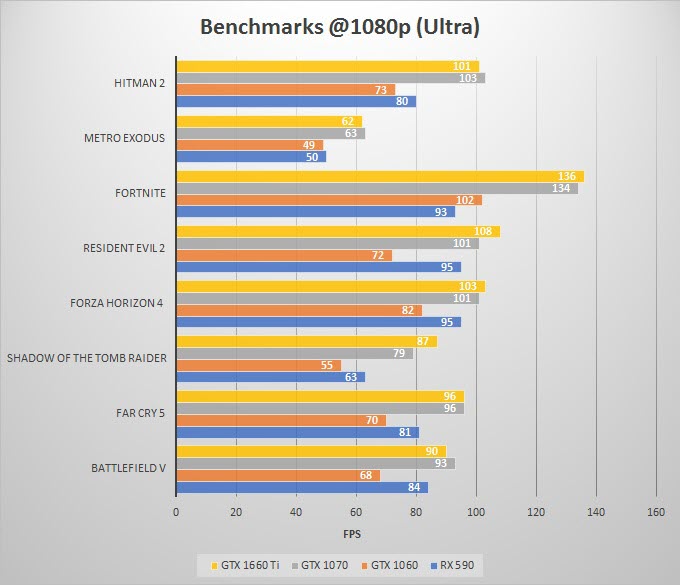
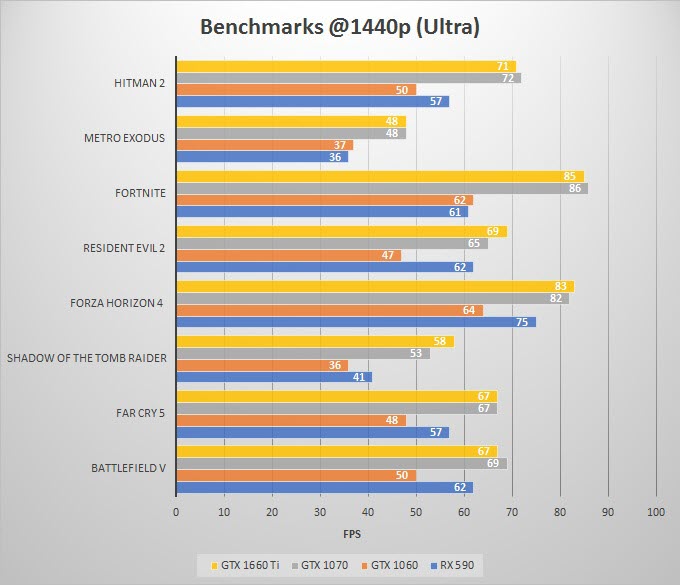
From the above gaming benchmarks, we can clearly see that GTX 1660 Ti is the fastest card here in most of the games. It is as fast as GTX 1070 and sometimes better, and around 40% faster than GTX 1060 in almost games. Also, it beats RX 590 clearly and is around 20% faster (or slightly more) than it. So, the winner here is clearly GTX 1660 Ti when it comes to gaming at 1080p and 1440p.
Power Consumption
When it comes to power consumption then the winners are GTX 1060 and the new GTX 1660 Ti, whereas the card that consumes the most power is the RX 590, which is no surprise at all. Also, you will need a good 450W to 500W PSU for these mid-range graphics cards.
Check out: Best Budget Power Supplies (PSU) for Graphics Cards
| GTX 1060 | GTX 1070 | GTX 1660 Ti | RX 590 | |
| Power Consumption | 120W | 150W | 120W | 225W |
| Recommended PSU | 400W | 500W | 450W | 550W |
Pricing & Availability
The least expensive card here is GTX 1060 while the most expensive is GTX 1070. The price of GTX 1660 Ti and Radeon RX 590 comes in between GTX 1060 and GTX 1070. The reference model of GTX 1660 Ti is priced at $279 MSRP, and you can also get an RX 590 at roughly this price too. However, cards from different graphics card manufacturers or board partners have different pricing for their cards depending on the cooler, overclocking, and other fancy features such as RGB lighting they offer with different models. So, you can check the latest prices and availability of these graphics cards from the links given below.
Check GTX 1660 Ti Price on Amazon
Check GTX 1060 Price on Amazon
Check GTX 1070 Price on Amazon
GTX 1660 Ti vs GTX 1070 vs GTX 1060 vs RX 590 Specifications
| Specifications | GTX 1060 | GTX 1070 | GTX 1660 Ti | RX 590 |
| GPU Chip | GP104 / GP106 | GP104 | TU116 | Polaris 30 |
| CUDA Cores / Stream Processors | 1280 CUDA Cores | 1920 CUDA Cores | 1536 CUDA Cores | 2304 SP |
| GPU Architecture | Pascal | Pascal | Turing | Polaris |
| Memory Size | 6GB GDDR5 / GDDR5X | 8GB GDDR5 | 6GB GDDR6 | 8GB GDDR5 |
| Memory Interface | 192-bit | 256-bit | 192-bit | 256-bit |
| Memory Bandwidth | 192 GB/s | 256 GB/s | 288 GB/s | 256 GB/s |
| Bus Interface | PCI Express 3.0 | PCI Express 3.0 | PCI Express 3.0 | PCI Express 3.0 |
| DirectX | 12 | 12 | 12 | 12 |
| OpenGL | 4.5 | 4.5 | 4.5 | 4.5 |
| Vulkan API | Yes | Yes | Yes | Yes |
| SLI / CrossFire | No | Yes (SLI) | No | Yes (CrossFire) |
| VR Ready | Yes | Yes | Yes | Yes |
| G-Sync / FreeSync | G-Sync & FreeSync | G-Sync & FreeSync | G-Sync & FreeSync | FreeSync |
| Power Consumption | 120W | 150W | 120W | 225W |
| Recommended PSU | 400W | 500W | 450W | 550W |
See also:
- GTX 1660 vs GTX 1660 Ti Comparison & Benchmarks
- GTX 1660 vs GTX 1060 vs RX 590 Comparison & Benchmarks
- GTX 1070 Ti vs RX Vega 56 Graphics Cards Comparison
- RTX 2060 vs GTX 1070 Ti vs GTX 1070 vs GTX 1060 Comparison
- GTX 1660 SUPER vs GTX 1660 Ti vs GTX 1660 vs RX 590 Comparison
Final Thoughts
Nvidia has finally hit the sweet spot with GTX 1660 Ti after that humongous disaster with RTX 20 series cards. The card is basically a GTX 1070 replacement, but with a much lower price tag and lower power consumption. There is absolutely no point in comparing GTX 1660 Ti with GTX 1060 and even RX 590 because it crushes them easily in every benchmark. The only thing in which GTX 1070 and RX 590 have an advantage over GTX 1660 Ti is the greater amount of video memory i.e. 8GB. However, for 1080p and 1440p gaming, 6GB is enough for most of the current AAA games, and the faster GDDR6 memory in GTX 1660 Ti makes up for the lack of 2GB VRAM it has in this case. So, in my opinion, GTX 1660 Ti is really a great product at merely $279 and is clearly the winner among all these cards here.
My Pick: GeForce GTX 1660 Ti
Check out: Best GTX 1660 Ti Cards for 1080p & 1440p Gaming
(*This post may contain affiliate links, which means I may receive a small commission if you choose to purchase through the links I provide (at no extra cost to you). Thank you for supporting the work I put into this site!)
